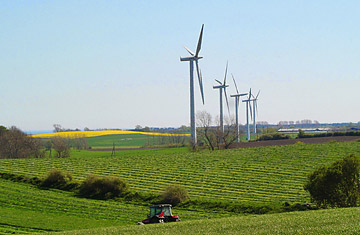
Wind-powered turbines in Denmark.
When former Vice President Al Gore returned to Capitol Hill on Jan. 28 to testify for the need for a new global deal on carbon emissions, he spoke from personal experience: In 1997 Gore helped guide the Kyoto Protocol to completion in Japan — but back at home, knowing the treaty lacked support, the Clinton Administration never brought it to a vote in the U.S. Senate.
Kyoto's key failing was that it called on developed countries to make mandatory CO2 emissions cuts, while letting developing countries — including massive emitters like China — essentially off the hook, an inequality that has to be resolved if the world is to craft a new treaty at the U.N. global warming summit in Copenhagen in December. (See the top 10 green ideas of 2008.)
"The very fact that developing countries like Brazil and Indonesia and China have now begun to take [climate] initiatives makes it a very different situation," an optimistic Gore told the Senate foreign relations committee. "This is a very different outlook than was the case in Kyoto."
Whether Copenhagen succeeds, however, isn't up to onlookers like Gore. That job falls to diplomats like Todd Stern, the new U.S. envoy on climate change; international bureaucrats like Yvo de Boer, the crisp Dutch executive-secretary of the United Nations Framework on Climate Change; and politicians like Connie Hedegaard, the Danish Minister for Climate and Energy, who will preside over the summit's proceedings.
It's a tall order, to say the least — after eight years of the Bush Administration largely stifling global negotiations on climate change, the world has barely 10 months, in the midst of the worst financial crisis since the Great Depression, to prepare for Copenhagen. "There are a lot of challenges now," says Hedegaard, speaking to TIME recently at the World Future Energy Summit in Abu Dhabi. "This is a special challenge, but also a special opportunity." (Listen to Hedegaard talk about the run-up to Copenhagen on this week's Greencast.)
Denmark may be a country of just 5.5 million people — about as big as a medium-sized city in China — but a fitting host of the climate change summit. Denmark has thrived while emphasizing clean energy and cutting carbon emissions — between 1980 and 2004, the country's GDP rose 56% while CO2 emissions dropped 35% — and thanks to smart policies and investment, more than a quarter of Denmark's electricity now comes from renewable sources. Danish companies also punch well above their weight in the growing wind turbine industry. To drum up global support for the summit, Hedegaard can easily make the case that the economy doesn't have to come before the environment — even during a global recession. "This isn't just about the climate crisis," she says. "This is about how we will grow for the future."
Copenhagen will shape the environmental future of the world, but in many ways, it will determine its economic future as well. The key, Hedegaard insists, will be the world's two biggest carbon emitters, the U.S. and China, each of which essentially sidestepped Kyoto. (Though China ratified the Kyoto Protocol, it wasn't required to do anything.) Hedegaard sees hope for firm carbon targets. In the U.S., Obama has talked green early in his term, added incentives for energy efficiency and renewables to his stimulus plan and supports a domestic carbon cap-and-trade program that experts believe needs to be in place if the U.S. is to take the lead at Copenhagen. As for China, Hedegaard and others think Beijing is ready to take on some kind of responsibility at Copenhagen — whether it means goals on energy efficiency or reducing the increase in their carbon emissions — depending on U.S. actions. "The key to the process is for the U.S. to engage more," she says. "China is not going to deliver unless the U.S. delivers. That will be the key to how far we can go in Copenhagen."
The question is: Can the U.S. act in time for Copenhagen? The answer is hardly certain. The first attempt at a national cap-and-trade bill, last year's Warner-Lieberman Act, didn't make it out of the full Senate. The U.S. has a new, greener President, but the sheer number of legislative priorities sitting on his desk could make cap and trade impossible to achieve this year. That doesn't mean Copenhagen will come and go without a deal, but, under the pressure to get something on paper, it's possible the summit will produce a watered down agreement insufficient to the scale of the challenge posed by climate change. "It's not just the question of having a deal, but an ambitious deal," says Hedegaard. "We need to come out with what is needed, and not just the least common denominator." But that will be easier said than done — as a former Vice President can tell her.
